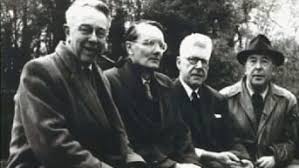
Poetic Diction was warmly received by the Inklings.
It persuaded Lewis that poetry and metaphor are a means, and perhaps the main means, to the discovery of new insights. In fact, the book may lie indirectly behind Lewis’s conversion to Christianity, which came in 1931.
He was then convinced by Tolkien’s argument that the historical life of Jesus was a true myth, a change of mind that requires an awakened sense that behind the literal lies a vitality that is in communion with the heart of reality, which theists call God.
Lewis’s indebtedness to Barfield for his discovery of the divine is implied in the dedication of Lewis’s book, The Allegory of Love. It is to Barfield, “Wisest and Best of My Unofficial Teachers”. Lewis was working on the book during the period leading up to his conversion.
Tolkien gained much from the book as well. The elves in The Lord of the Rings are in many ways a re-imagining of an ancient society in which language is still poetic. Its evolutionary ideas also informed his invention of long forgotten tongues. The Tolkien scholar, Verlyn Flieger, cites a line from The Hobbit that is thoroughly Barfieldian: “Men changed the language that they learned of elves in the days when all the world was wonderful.”
Another occasional Inkling, and future Christian ashram leader, Bede Griffiths, said Poetic Diction “had a permanent effect upon my life.”